Key takeaways:
- Data privacy laws, such as GDPR and CCPA, are essential for protecting personal information and promoting consumer trust in organizations.
- Key principles of data privacy include transparency, informed consent, and robust security measures to safeguard personal data.
- Compliance requires businesses to invest in employee training, regular audits, and strong data encryption to navigate regulatory challenges effectively.
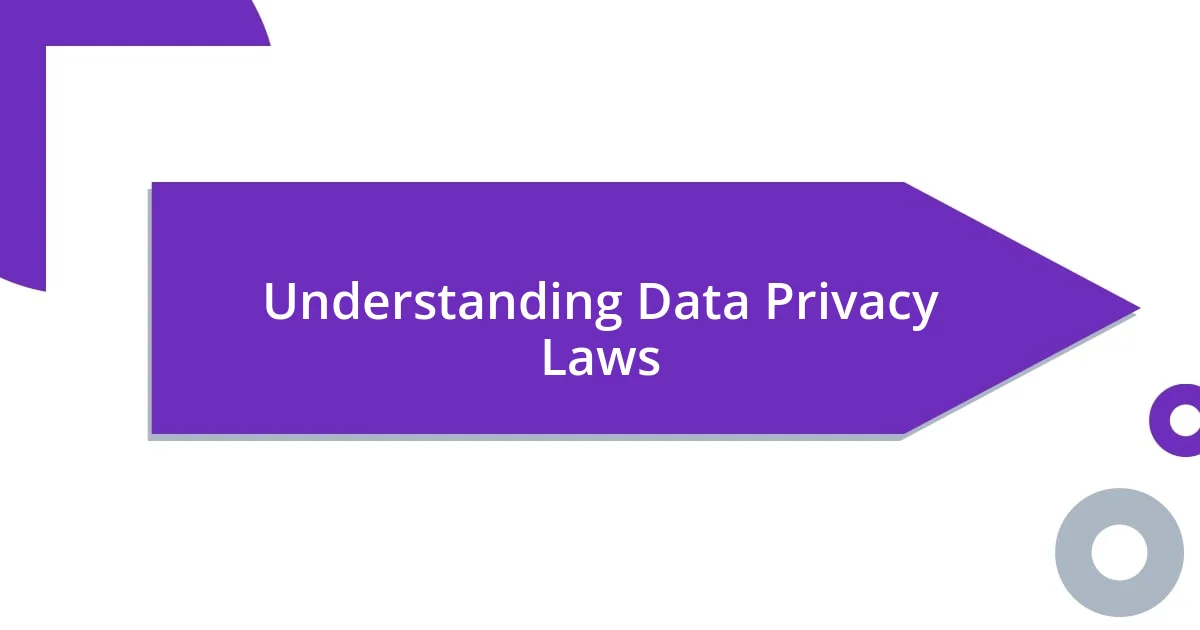
Understanding Data Privacy Laws
Data privacy laws are a set of regulations designed to protect individuals’ personal information and govern how organizations collect, store, and use that data. I remember the time I signed up for an online service, only to be bombarded with endless marketing emails—was my data really safe? It’s crucial for individuals to understand these laws because they empower us to decide who has access to our information and how it’s used.
When I first started exploring data privacy laws, I was surprised by how intricate they can be. Take the General Data Protection Regulation (GDPR) in Europe; it outlines strict guidelines that can make or break a business’s approach to handling data. Have you ever considered how companies must rethink their strategies just to comply? It’s a complex dance between safeguarding consumer rights and maintaining operational efficiency.
Observing how companies navigate these laws can be fascinating. I’ve seen businesses invest heavily in compliance measures, driven by the fear of hefty fines. But it goes beyond just avoiding penalties—there’s a genuine desire among many companies to foster trust. Isn’t it comforting to know that there are laws in place prioritizing our privacy? Understanding these regulations can empower us not just as consumers, but also as active participants in how our data is handled.
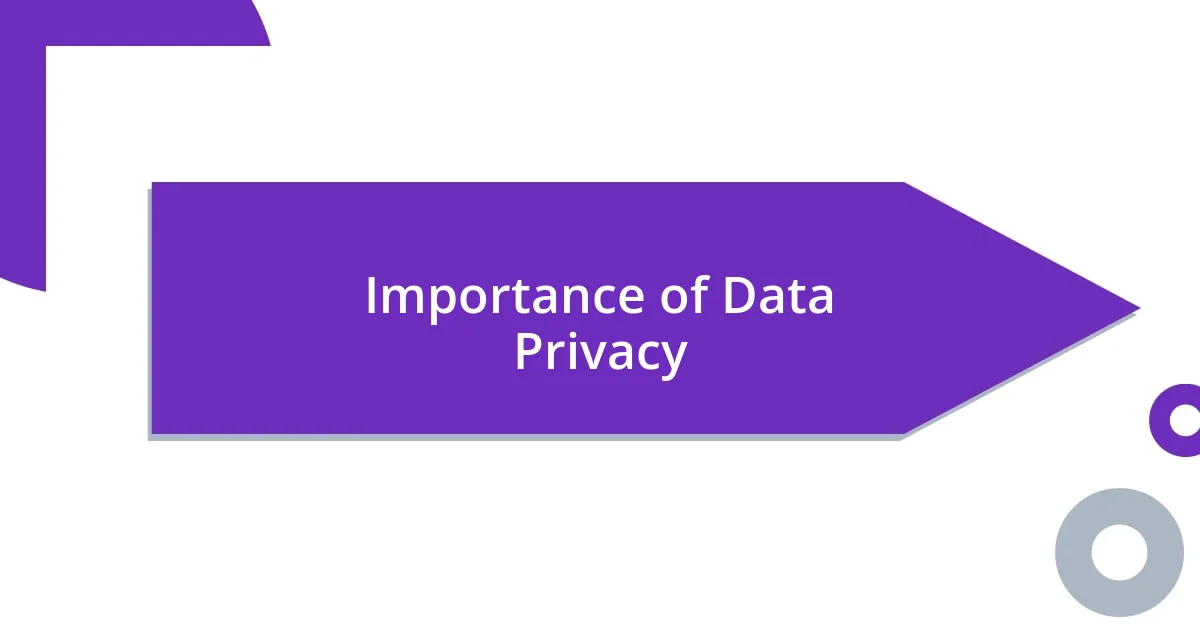
Importance of Data Privacy
Data privacy is of utmost importance not just for individuals, but for society as a whole. When I think back to my early days on the internet, I can’t help but feel a mix of nostalgia and unease. I remember sharing personal details on platforms without a second thought, only to later realize how exposed I had been. This outdated trust made me more aware of the importance of laws designed to protect my information. We need these protections to avoid unnecessary harm, whether through identity theft or personal data misuse.
Consider these key points regarding the importance of data privacy:
- Protects Personal Information: It safeguards sensitive information from unauthorized access.
- Builds Trust: When companies prioritize privacy, it encourages consumer confidence and loyalty.
- Promotes Accountability: Data privacy regulations hold organizations responsible for their data handling practices.
- Encourages Compliance: Businesses must adhere to laws motivating them to establish robust data protection policies.
Reflecting on these aspects, I realize how essential data privacy is in today’s digital landscape. It’s not just about rules; it’s about creating an environment where individuals feel secure and empowered.
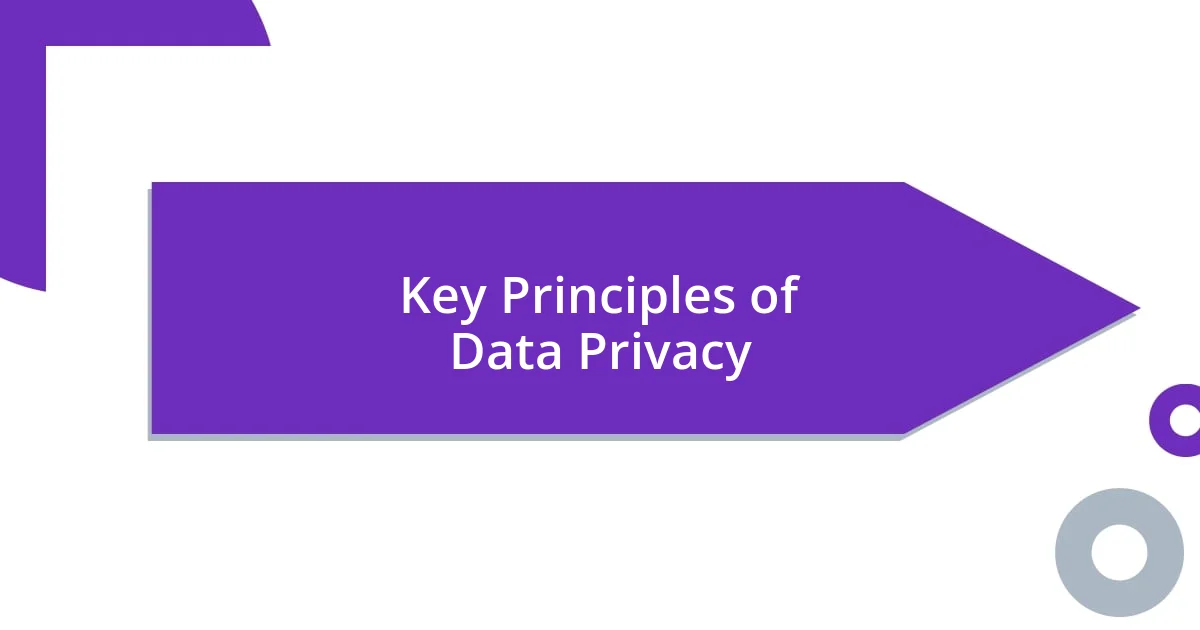
Key Principles of Data Privacy
The key principles of data privacy revolve around transparency, consent, and security. One principle that resonates with me is the necessity for organizations to be open about their data practices. I often wonder how often companies truly disclose their data collection methods. I recall a time when I was surprised by the amount of data a simple mobile app requested for permissions—what did it truly need my location and contact access for? This made me realize how important it is for users to know exactly how their information is being gathered and utilized.
Another crucial principle is the concept of consent, which should never be taken lightly. In my own experiences, I’ve sometimes skimmed through consent forms without fully understanding what I was agreeing to. Have you ever found yourself clicking ‘Accept’ just to access a service? It’s essential for companies to ensure that consent is informed and voluntary. This principle empowers individuals to take control of their data, sparking a sense of ownership over their personal information.
Then there’s security, which is the backbone of all these principles. I remember being in a situation where a data breach impacted a company I trusted, and I felt an unsettling vulnerability. Security measures must be in place to protect personal data from unauthorized access or breaches. This principle reinforces that robust security measures are critical for maintaining trust in the digital ecosystem.
| Principle | Description |
|---|---|
| Transparency | Organizations must clearly explain their data handling practices. |
| Consent | Users should have informed control over their personal data sharing. |
| Security | Robust measures must exist to protect personal information from breaches. |
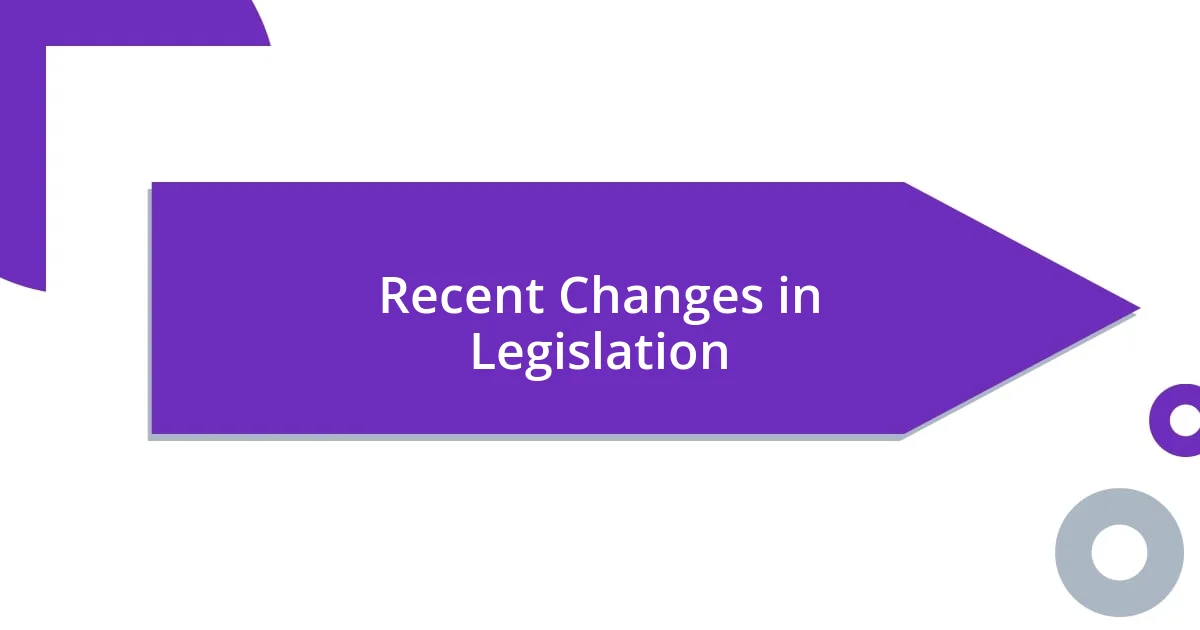
Recent Changes in Legislation
Recent data privacy legislation has seen significant shifts aimed at enhancing individual rights. For example, the California Consumer Privacy Act (CCPA), enacted in 2020, was a game-changer that brought personal data ownership to the forefront. I vividly recall the discussions surrounding this law in tech circles, where many debated whether businesses could adapt to the new requirements without losing their competitive edge.
Across the Atlantic, the European Union’s General Data Protection Regulation (GDPR) has continued to evolve, tightening protections and fines for breaches. I often find myself reflecting on how much more cautious I’ve become in sharing my information since GDPR was enacted. Have you noticed the differences in how companies communicate their data practices since these regulations? It’s a stark reminder of the power that legislation can wield in shaping corporate behavior.
In addition, countries like Brazil have introduced their data protection laws, closely mirroring GDPR’s structure. I find it fascinating to see global trends converge toward stricter data governance, emphasizing the importance of transparency and user autonomy. When did we start thinking that it was acceptable to sell our personal information without our explicit consent? These laws might just be the beginning of a much-needed cultural shift towards valuing individual privacy rights.
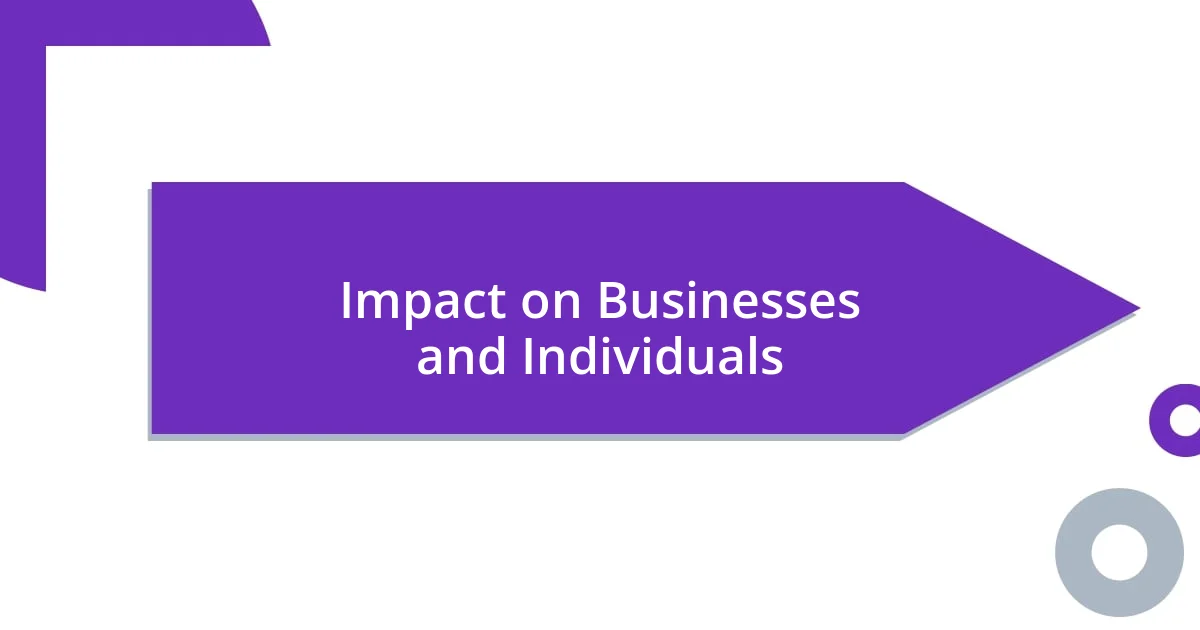
Impact on Businesses and Individuals
When considering the impact of data privacy laws on businesses, I’ve witnessed how these regulations can act as double-edged swords. On one hand, they push companies to be more transparent and accountable, which is great for us as consumers. But, I’ve also seen smaller businesses struggle under the weight of compliance costs. I sometimes wonder if the regulations inadvertently favor larger companies that can more easily absorb these expenses.
For individuals, these laws have transformed how we interact with technology and services. I remember the first time I had to opt-in to data tracking settings on my favorite streaming app. Suddenly, I was faced with the choice of missing out on personalized recommendations or sacrificing my privacy. We’re presented with choices now that make us acutely aware of our digital footprint. Isn’t it interesting how such decisions can feel both empowering and burdensome at the same time?
Navigating data privacy laws has also made me rethink what I share online. After reflecting on my own experiences, I found that I’ve become more intentional about the information I provide. I now scrutinize privacy policies more closely, asking myself, “Is this really necessary?” This shift is a clear indication that data privacy laws not only shape business practices but also empower individuals to take charge of their own data and its usage.
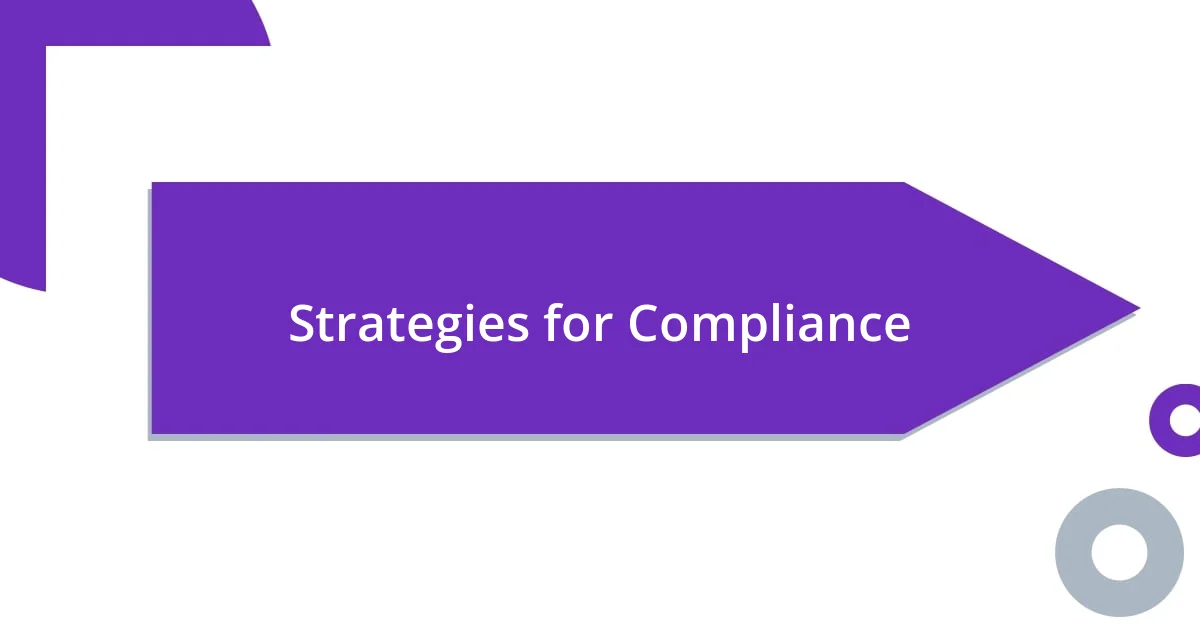
Strategies for Compliance
To comply with data privacy laws, organizations must adopt comprehensive training programs for their employees. I remember a time when I joined a new tech company that emphasized this practice. At first, it felt like another mandatory course, but it genuinely opened my eyes to the significance of data handling. Have you ever been part of a training that transformed your understanding of an issue? It’s remarkable how such sessions can instill a culture of accountability and vigilance around data privacy.
Another crucial strategy is conducting regular audits of data management practices. I’ve participated in a few audits that revealed surprising gaps in our compliance efforts. Each time, I left with a renewed sense of responsibility. It made me think: how many companies overlook these checks, assuming they’re compliant without really knowing? These audits not only identify weaknesses but also cultivate an ongoing commitment to improvement, ensuring that data handling evolves with changing regulations.
Lastly, implementing robust data encryption measures is vital. I recall a situation where a friend’s personal information was compromised due to inadequate security. The fallout was immense, both personally and reputationally for the organization involved. Have you ever thought about how vulnerable our data really is? By prioritizing encryption, businesses can protect sensitive information, demonstrating to consumers that they value privacy and security, which ultimately reinforces trust.














